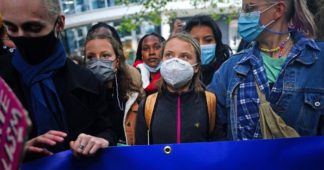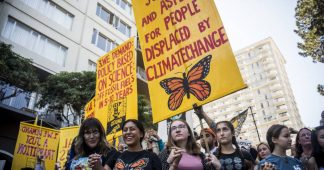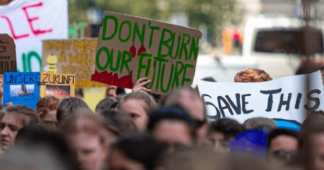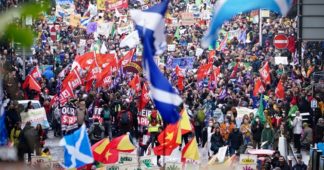by Vijay Prashad
Nov.12, 2021
photo: Hwang Jeongeun
Dear friends,
Greeting from the desk of the Tricontinental: Institute for Social Research.
Nothing useful seemed to emerge from the United Nations Framework Convention on Climate Change (UNFCCC) at COP26 this week. The leaders of developed countries made tired speeches about their commitment to reversing the climate catastrophe. Their words rang with the clichés of spin doctors, their sincerity zero, their actual commitments to lowering carbon emissions nil. Mitzi Jonelle Tan, a Filipino climate activist and spokesperson for Fridays for Future, said that these leaders ‘spew empty, tired promises’, leaving young people like her with a ‘sense of betrayal’. As a child, she said, she felt the danger of being caught up in flash floods in the Philippines, floods that have terrible repercussions for high-risk countries. ‘There’s a climate trauma that young people experience’, said Tan, ‘yet the UNFCCC keeps us out’.
The youth-led Pacific Climate Warriors marched through rainswept Glasgow on 6 November, their flags of the South Pacific Islands fluttering in the fast wind. They were one amongst many groups from small island states and from areas with large populations of indigenous peoples who face great and urgent threats to their existence. ‘We don’t want your pity’, said Reverend James Bhagwan of the Pacific Climate Warriors. ‘We want action’.
War and its environmental discontents were also on the minds of many. From 1981–2000, the Greenham Common Women’s Peace Camp was set up as a permanent protest against the storage of Trident nuclear missiles in the United Kingdom. Alison Lochhead, a former resident of the Peace Camp, marched in Glasgow with determination. ‘Where will you now set up your camp?’ I asked her. ‘Across the world’, she replied–a world in which the United States military is the largest institutional polluter. Activist Myshele Haywood marched with her dog and a sign that read, ‘The global military is the world’s biggest polluter’. The other side of the sign read, ‘Oil is too precious to burn. Save it to make medicine, plastics, and other things’.
On 7 November, during the COP26 Coalition People’s Summit, I was on the jury of The People’s Tribunal on the UNFCCC and its failure to address a range of issues. We heard from a range of rapporteurs and witnesses, each speaking with great feeling about the differential climate catastrophes on nature and on human life. Every minute, $11 million is spent to subsidise fossil fuels (that’s $5.9 trillion spent in 2020 alone); this money underwrites the cascading climate catastrophe, yet few funds are raised to mitigate the negative effects of fossil fuels or to transition to renewable forms of energy. The remainder of this newsletter details the findings of the Tribunal, which was comprised of Ambassador Lumumba Di-Aping (former Chief Climate Negotiator for the G77 and China), Katerina Anastasiou (Transform Europe), Samantha Hargreaves (WoMin African Alliance), Larry Lohmann (The Corner House), and me.
The Verdict of The People’s Tribunal: People and Nature vs the UNFCCC – 7 November 2021
There were six charges put before the Tribunal concerning the failures of the UNFCCC to:
- address the root causes of climate change;
- address global social and economic injustices;
- come up with appropriate climate finance for planetary and social survival, including the rights of future generations;
- create pathways to a just transition;
- regulate corporations and avoid the corporate capture of the UNFCCC process; and
- recognise, promote, and protect the Rights of Nature law.
The jury of five listened carefully to the special prosecutor, to the rapporteurs, and to the witnesses. We were unified in our conclusion that the UNFCCC, which was signed by 154 nations in 1992 and ratified by 197 countries by 1994, has utterly failed the peoples of the world and all species that rely on a healthy planet to survive by failing to stop climate change. This perilous inaction has failed to limit the increase of the average global temperature.
In its latest 2021 reports, the Intergovernmental Panel on Climate Change (IPCC) found that the Earth has reached an average temperature increase of 1.1 degrees, while sub-Saharan Africa is close to breaching the ‘safe’ 1.5 degree mark.
The UNFCCC has forged an intimate partnership with the very corporations that have created the climate crisis. It has allowed powerful governments to threaten poor countries into submission, guaranteeing certain misery and death for hundreds of millions of people in the poorest parts of the world over the next two decades.
The UNFCCC’s inaction has permitted powerful oil, mining, agriculture, logging, aviation, fishing, and other corporations to continue their carbon intensive activities unfettered. This has contributed to a growing biodiversity crisis: recent estimates suggest that anywhere from 2,000 species (at the low end) to 100,000 species (at the high end) are being exterminated each year. The UNFCCC is implicated in mass extinction.
The UNFCCC has refused to democratise the process and to listen to those on the frontlines of the crisis. This includes the one billion children who live in the 33 countries that are at ‘extremely high risk’ due to the climate crisis–in other words, almost half of the world’s 2.2 billion children–as well as indigenous communities and working-class and peasant women from the countries and nations that bear the brunt of a crisis that they did not produce.
As the world confronts a rapidly escalating climate crisis–evidenced by flooding, droughts, cyclones, hurricanes, rising sea levels, furious fires, and new pandemics–the poorest, most vulnerable, and highly indebted nations are owed a great climate debt.
Powerful nations in the UNFCCC have forced a rollback on earlier commitments to global redress for the long history of unequal and uneven development between nations. Developed countries pledged $100 billion per year for the climate fund but they have failed to provide that money, thereby neglecting their own commitments. Instead, developed countries plough trillions of dollars into their own national efforts to mitigate the impacts of climate change and support adaptation to a warming climate, while the poorest and most heavily indebted nations are left to fend for themselves.
We, the jury, find that the UNFCCC violated the UN Charter, which demands that UN members states ‘take effective collective measures for the prevention and removal of threats to peace’ (Chapter 1). The Charter charges states ‘to achieve international cooperation in solving international problems’.
The UNFCCC has also violated Chapter IX of the UN Charter, ignoring Article 55’s demand to create ‘conditions of stability and well-being’ as well as ‘economic progress and social progress’ and to promote ‘universal respect for, and observance of, human rights.’ Furthermore, the UNFCCC has violated Article 56, which enjoins member states to take ‘joint and separate action in cooperation’ with the UN.
We, the jury of the People’s Tribunal, find the UNFCCC guilty of the charges made by the special prosecutor and established by the witnesses. In light of our sentence, we claim the following measures of redress for the peoples of the world:
- The discredited and unrepresentative UNFCCC must be disbanded in its current form and reconstituted from the ground up. The new people-led global Climate Forum must first and foremost be democratic and centre those carrying the fallout of the environmental and climate collapse. The polluters of our Earth cannot be part of a Climate Forum which serves people and the planet first.
- Historically developed countries must fully finance the bill to end carbon emissions and pay the climate debt owed to the peoples of the Global South; such action is necessary to help the most impacted populations mitigate the worst of the climate fallout and adapt to a rapidly warming climate. There is a specific debt owed to working women in the Global South, who have worked harder and longer hours to support their households as they navigate the unfolding crisis. Such debts must be settled through democratic, people-centred mechanisms which circumvent corrupt states and corporations that are currently profiteering from the crisis.
- Illicit financial flows must be cut off and immediately expropriated to fund climate adaptation and just transitions in formerly colonised nations. These illicit financial flows have resulted in the theft of $88.6 billion from Africa per year, while up to $32 trillion sits in illegal tax havens.
- Global military spending–nearly $2 trillion in 2020 alone, amounting to trillions over past decades–must be converted to fund climate justice initiatives. Similarly, the odious and illegitimate debt of poor nations must be identified and cancelled. This would free up significant national revenues to build the infrastructure, services, and supports that will allow billions of people to navigate the climate emergency. The vast sums of money spent on the national security plans of wealthy nations, which aim to shield those nations responsible for the vast majority of pollution from those fleeing climate change-induced catastrophes, must be similarly diverted to support the peoples of the Global South.
- A transformed and representative UN General Assembly must call a special session on reparations for ecological and climate debt, damages related to slavery and colonialism, and the reproductive debt owed to women in the Global South.
- This People’s Tribunal must hold the UNFCCC to account for its crimes against nature and people through legal action.
- The UN Binding Treaty on Transnational Corporations and Human Rights affirms not only the obligation of transnational corporations to respect all human rights, but also the rights of states to provide protections against human rights violations committed by transnational corporations. In addition, the treaty affirms human rights over the interests of trade and investment treaties and provides for the free, prior, informed, and continuous consent of communities confronting corporate-driven ‘development’ projects.
- The UN General Assembly must open a special session on ‘trade liberalisation’ and ‘market technologies’, thoroughly examining their negative impacts on agriculture, biodiversity, and ecosystems, and the way that they create and reproduce the crisis.
- The UN General Assembly must immediately hold a hearing on the Universal Declaration of the Rights of Mother Earth.
The Marshall Islands, a chain of coral atolls and volcanic islands, is one of fourteen countries in Oceania that is greatly threatened by rising sea levels. Recent studies show that 96% of Majuro, the capital, is at risk of frequent flooding while 37% of the city’s existing buildings face ‘permanent inundation’ in the absence of any form of adaptation.
In 2014, Kathy Jetñil-Kijiner, a Marshallese poet, wrote a rousing poem for her seven-year-old daughter Matefele Peinam:
… there are thousands out on the street
marching with signs
hand in hand
chanting for change NOW
and they’re marching for you, baby
they’re marching for us
because we deserve to do more than just
survive
we deserve
to thrive …
Warmly,
Vijay
Published at mronline.org
We remind our readers that publication of articles on our site does not mean that we agree with what is written. Our policy is to publish anything which we consider of interest, so as to assist our readers in forming their opinions. Sometimes we even publish articles with which we totally disagree, since we believe it is important for our readers to be informed on as wide a spectrum of views as possible.











